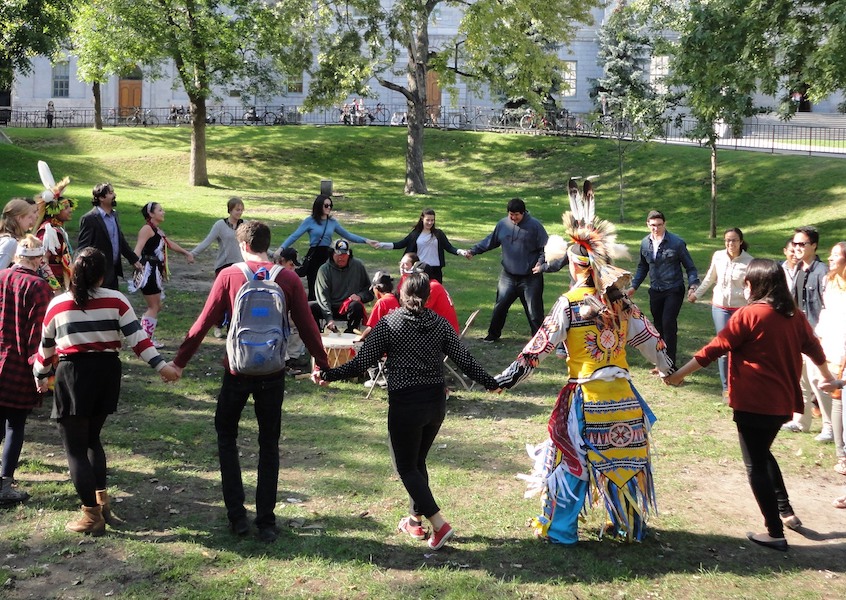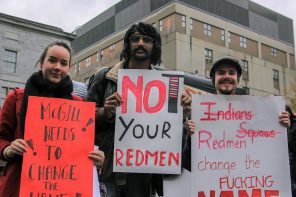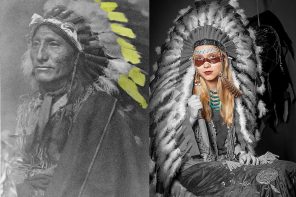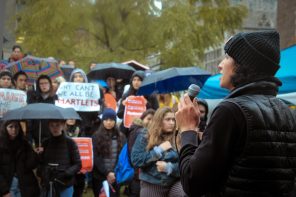The circumstances surrounding the death of Joyce Echaquan on Monday, September 29, have shed light on the state of anti-Indigenous racism in Quebec in recent weeks.
Hospital staff made degrading and racist comments towards Echaquan as she lay dying on a hospital bed in Manawan, a community just 250 km north of Montreal.
37-year-old Echaquan, a mother of seven and an Atikamekw woman was taken to the hospital for stomach pains. A nurse and an orderly have both been fired for her mistreatment following the associated backlash, but many say that this is not enough. During her suffering, Echaquan managed to pull out her phone and film a Facebook Livestream of her mistreatment, which included racially-targeted language, blaming her for her illness.
Echaquan’s family announced they would take legal action.
Echaquan’s story has had profound impacts, sparking nationwide anger, many see it as a sobering reminder that racism in Canada is still very prevalent today. Though efforts like Orange Shirt Day help raise awareness for the maltreatment and hardships of First Nations, Inuit, and Metis people in Canada, there is still progress to be made.
University campuses are not free from systemic discrimination against Indigenous students; McGill University’s Indigenous students face both overt and concealed racism throughout their education. The Bull & Bear spoke to Indigenous students and faculty about the treatment of Indigenous issues on campus.
U3 international development studies major, Renee Corbiere, an Anishinabek from Batchawana Ojibway Nation and Kanien’keha from Kanesatake Mohawk Nation, shared some of her ordeals with the settler-colonial rhetoric that still has a prevalent place in classrooms.
“As an international development major I find I am often reading offensive writing for class assignments that discuss issues through colonial-capitalistic lenses,” explained Corbiere. “I often find that in my responses to colonial readings (in which I disagree with the authors) I feel as though I am losing marks for nothing other than my contradicting opinion.”
Renee is one of just 25 Indigenous students at McGill and has had to deal with systemic discrimination in ways that go beyond the lecture hall. The McGill Wellness Hub offers free, confidential medical and mental health services to all its students. When Renee went to the clinic to discuss mental health matters, she was subjected to a clinical questioning that used her ethnicity to dismiss her experiences and difficulties.
“I saw an old, white, French man who asked me about 12 times if I was sure I didn’t just have diabetes. Diabetes is prevalent in First Nations communities due to the high price of food and high poverty rates which force people to rely on unhealthy alternatives. I am quite certain my mental health is not a factor of diabetes I do not have, however, the psychiatrist at McGill refused to prescribe me any medication for my illness as it’s “addictive”; I presume only another racist stereotype being perpetuated.”
This negligence experienced by Indigenous students is echoed in Canadian and Quebec legal and social policy. In response to Joyce Echaquan’s death, Premier Legault formally apologized for her mistreatment but stated that systemic racism is not an issue in Quebec.
In a news conference in early October, Legault claimed that “we have some people who think there is a system of racism in Quebec. There is also a part of the population thinking there is no system… we have some people that are racist… we have put a campaign in place to make sure that the people who are racist in Quebec change their approach.”
McGill does offer resources specifically for Indigenous students, including guaranteed funding and a place for support and community at First People’s House. However, the university does have a history of delaying decisions related to the representation of Indigenous issues on campus.
The “Change the Name” movement that gained traction in fall 2018, led by then student Tomas Jirousek, of the Kainai First Nation of Alberta, challenged the longstanding McGill varsity men’s team name “Redmen,” an offensive term for Indigenous people of North America. The McGill administration eventually responded to the student body consensus, agreeing to change the name. On November 17, they announced that the team would be called the “Redbirds.”
During the “Change the Name” protest back in 2018, the Bull and Bear spoke to Janelle Bruneau, an Indigeneous woman from the Deh Cho Dene territory and then-U3 geography student, who stated that McGill had “a long way to go,” citing the fact that the university only started its Indigenous studies minor program in 2014, and that few courses are offered under that program. “McGill can be a very harmful place for Indigenous students,” she explained.
Tomas Jirousek, the former McGill student who founded the #ChangetheName campaign, noted that McGill’s efforts to support and represent Indigenous students and faculty has only just begun. “There needs to be more hiring of indigenous professors –– that’s a really big one. There needs to be an expansion of support services for Indigenous students, and there needs to be an expansion of Indigenous studies program. Those are the three big things that need to happen as McGill moves forward.”
A few professors in the faculty of arts, who wished to remain anonymous, stated that while McGill has made strides in supporting its Indigenous community, there is still more work that can be done. Suggested improvements were to hire more Indigenous professors, and offer more courses on a range of Indigenous issues, although they did explain that this expansion would need to be handled in a nuanced way, as the nature of Indigenous issues are “often-engaged.” The possibility of expanding the Indigenous program could also include more course offerings on Indigenous languages, specifically “Oji-Cree, one of the most widely spoken Indigenous languages on Turtle Island.”
“Some necessary steps could be the recognition of Indigenous faculty and their extensive labour, the recognition of “non-traditional” scholarship and alternative forms of knowing, [and] the recognition of co-authors and knowledge keepers in the tenure system––which to this day remains Western focused and needs an overhaul,” stated one faculty member.
The following organizations can provide support and community to Indigenous students:
First People’s House https://www.mcgill.ca/fph/welcome
Native Friendship Centre Montreal http://nfcm.org/
Native Montreal http://www.nativemontreal.com/en/home/about-us.html?lang=EN
Indigenous Student Alliance: http://indigsa-mcgill.weebly.com/
We Matter Campaign: https://wemattercampaign.org/
As well, students may find other resources here.





